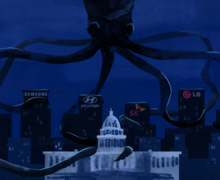Package deal: Coaches often lure top recruits by going after friends on their high school teams
Bruce Williams felt used, but he didn’t mind.
When he was a senior at Christian Brothers Academy in Syracuse with fellow SU sophomore Lavar Lobdell, some schools only recruited him to get Lobdell, a heralded wide receiver and close friend.
‘(West Virginia) never told me but I knew Lavar was their shining point,’ Williams said. ‘He got more attention there than I did (when we went to visit). They showed him around and had him in the front and I just chilled in the back.’
Among the many tactics schools use to nab big names, offering a friend or teammate is in the bag of tricks. Four Big East schools, including Syracuse, have multiple verbal pledges from the same high school for the recruiting class of 2007. Florida has six commitments from the same high school for next season alone.
While that doesn’t imply the commitments are tied together as ‘package deals,’ as they are called, it may indicate a growing trend in the competitive world of college football recruiting.
Scooter Berry, a defensive tackle for the Mountaineers, said he had similar experiences to Williams during his recruitment, but not at WVU. Berry and his brother Jason Gwaltney, a top running back recruit in 2005, saw many offers from the same schools.
‘I would say (schools used me) but they try to make it seem unintentional,’ Berry said.
Central Florida offered scholarships to Berry and Gwaltney, teammates at North Babylon High School on Long Island, but when Gwaltney said he wasn’t interested in the Golden Knights in January of 2005, they withdrew their offer to Berry.
Syracuse linebacker Mike Owen, who played in the same high school conference as Berry and Gwaltney, said rumor had it Berry only received an offer from the Mountaineers because of his brother.
‘He was raw,’ Owen said of Berry. ‘He would’ve got offered probably, but I think that’s what influenced Jason’s decision because that was Scooter’s only offer at the time.’
Berry denied that he and his brother were a package. He said the proof lies in the fact that Gwaltney left West Virginia while Berry is still on the team (though NCAA rules prohibit the Mountaineers from withdrawing Berry’s scholarship because of Gwaltney).
North Babylon football coach Terry Manning declined comment about the brothers’ recruitment.
Regardless, while the tactic is acceptable to some coaches and players, it is frowned upon in many parts of the recruiting world.
DeMatha Catholic of Hyattsville, Md., has sent 10 recruits to Syracuse in Bill McGregor’s 24 years as coach of the high school. While he hasn’t seen package-deal recruiting, he says schools that use questionable tactics are immediately blacklisted among his kids.
‘I wouldn’t allow them to offer packages,’ he said. ‘I’d never accept a school that did that, it’s not the way recruiting should be done.
‘There are so many schools that do things right, we don’t need any trouble. If they’re doing that during recruiting, wait until the kid actually gets on campus.’
McGregor said Syracuse and recruiting coordinator Chris White do things right. Every DeMatha alumnus that’s played at Syracuse has graduated and told McGregor they were treated fairly. McGregor said head coach Greg Robinson and former head coach Paul Pasqualoni’s reputations alone made them attractive options.
White, who has been on staff under both coaches, said Syracuse has not offered a package deal, but they would not rule it out if there was a significant need. In the instance of Berry and Gwaltney, to whom the Orange offered a scholarship, White said the SU coaching staff ruled out a deal because Berry didn’t fit SU’s needs.
Nonetheless, White says it’s difficult to secure two recruits from the same class.
‘Some are more highly recruited than the other player and it’s sometimes an uncomfortable situation,’ White said. ‘You try to be personal with a kid by writing letters but if you recruit 25 players, you really write the same letters. When the kids open them together they see they’re essentially the same letter.’
Still, SU has two pairs of recruits from the same high school classes and one more pair on the way in Max Suter and Cody Catalina (Greensburg Catholic, Penn.). The Orange pursued a third recruit from Greensburg, Nick Sukay, but did not renege on Suter and Catalina when Sukay chose Penn State.
Catalina said the three were never offered as a package but that he’d heard of schools using that to entice recruits.
‘I don’t think it’s really a good recruiting tactic but if that’s what they have to do, that’s what they have to do,’ Catalina said.
As for players like Berry and Williams, they say being the bait to entice their friend motivated them to train harder to prove they deserved a scholarship. For Berry, it worked out. While Gwaltney has left school, Berry is playing defensive tackle for the No. 4 team in the country and working toward a degree.
Williams said he understands why teams did it and he doesn’t blame them for going after Lobdell, a national top-20 wide receiver recruit. When Robinson came to SU, he offered Williams and Lobdell separately and Williams said they made their decision on an individual basis.
Williams said both schools and players are part of a larger recruiting game.
‘I think it was a turn off for Lavar, we both knew (WVU) were (offering me) to get him,’ Williams said. ‘But if I can get to a Division I school because of my friend then I’d do it.’
Published on September 19, 2006 at 12:00 pm





